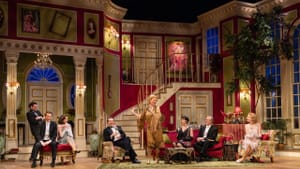Stay in the Loop
BSR publishes on a weekly schedule, with an email newsletter every Wednesday and Thursday morning. There’s no paywall, and subscribing is always free.
Low-grade fever
Walnut Street Theatre presents Noël Coward’s Hay Fever

Chaos reigns supreme in Hay Fever, Noël Coward’s screwy comedy of no manners. So why does the production that just opened at the Walnut Street Theatre often feel so tame?
In crafting this 1924 amusement, Coward turned to one of his favorite subjects: the upper crust behaving badly. Set over a long weekend at a ritzy country estate, the action follows the Bliss family’s attempts to distract and disorient one another, using unwitting houseguests as their pawns. Actor Judith (Alicia Roper) and her novelist husband David (Peter Herrick), along with their children Sorel (Anna Bailey) and Simon (Brandon O’Rourke), invite a bevy of visitors whose surprising entanglements reveal themselves over the course of three acts.
In the classic fashion of British farce, there’s a lot of business but nothing much of consequence. The characters play parlor games, execute clandestine assignations, and ignite old recriminations. Each caller brings a touch of their own personality to the proceedings: the youthful and adoring Sandy Tyrell (Jared Calhoun), invited by Judith; Simon’s potential paramour, the stylish Myra Arundel (Patricia Noonan); the fogeyish Richard Greatham (Harry Smith), welcomed by Sorel; and the airy Jackie Coryton (Ellie Mooney), David’s object of infatuation.
In search of verve
In addition to the wit of his prose, Coward had a knack for situational comedy—a good deal of the humor comes from watching how these mismatched and occasionally disagreeable people interact with each other. The performance style requires distinction and verve, along with snappy pacing to move the action breathlessly forward. These elements are in short supply under Bill Van Horn’s direction, where the performers rarely demonstrate the sort of intimacy and understanding you’d expect from a family invested in the embarrassment of its members.
Because of that, the hijinks largely fall flat. And although the production clocks in at a bare two hours, including a long intermission, the proceedings drag from the moment the scrim curtain rises. The actors deliver their lines professionally, but with little feeling for Coward’s biting humor; the occasionally overlapping banter never reaches the correct level of frenzy. The plot twists—such as they are—aren’t necessarily meant to be surprising, but here they barely register.
Spotty star turns
Coward crafted the role of Judith Bliss as an unabashed star turn. Based in part on the great actor Laurette Taylor, it’s been essayed by the likes of Edith Evans, Rosemary Harris, Judi Dench, and Lindsay Duncan. Roper demonstrates a wonderfully low speaking voice that she uses to humorous effect, although it’s often in service of the same line reading delivered over and over. She lacks the larger-than-life quality needed to convince the audience of Judith’s stage prowess and her undeniable sway over everyone who enters her orbit.
Herrick, a late replacement for Dan Olmstead, seems a touch unsteady as the self-centered David, perhaps due to a lack of rehearsal. Bailey lacks the necessary verve as the flapperish Sorel, but O’Rourke brings a pleasant low-key energy to the artistic Simon. As the houseguests, Noonan and Mooney shamelessly overact, while Calhoun barely registers; only Smith hits the right note of stiff-upper-lip starchiness. Charlotte Northeast brings a welcome jolt of broad comedy to her scenes as Clara, the Bliss family’s cynical maid, though it’s the kind of performance where a little goes a long way.
Families behaving badly
If walls could talk, Roman Tatarowicz’s set would be the hit of the Philadelphia season. The Bliss country estate dazzles enough to earn its own applause, though a prominently displayed replica of Tamara de Lempicka’s Portrait de Romana de la Salle makes little sense, as it hadn’t yet been painted when the play takes place. Other design elements falter: Mary Folino’s costumes are not always flattering; Tess James’s lighting moves from distractingly bright to muddily dusky with no discernible reason.
Coward’s plays remain in the repertoire because they deal with themes that hold persistent interest to audiences. How much of the comedic canon—and the dramatic one, for that matter—comes down to a family behaving badly? But a successful production of Hay Fever requires a wild energy that this staging rarely taps. Like the allergic condition referenced in the title, the experience seems like a minor annoyance that eventually flitters away.
What, When, Where
Hay Fever. By Noël Coward, directed by Bill Van Horn. Through March 9, 2025, at Walnut Street Theatre, 825 Walnut Street, Philadelphia. (215) 574-3550 or walnutstreettheatre.org.
Accessibility
Walnut Street Theatre is a wheelchair-accessible venue. Patrons can purchase designated wheelchair seating by calling (215) 574-3550, ext. 6. There will be an open-captioned performance of Hay Fever on Sunday, February 23, at 7pm.
Sign up for our newsletter
All of the week's new articles, all in one place. Sign up for the free weekly BSR newsletters, and don't miss a conversation.

 Cameron Kelsall
Cameron Kelsall